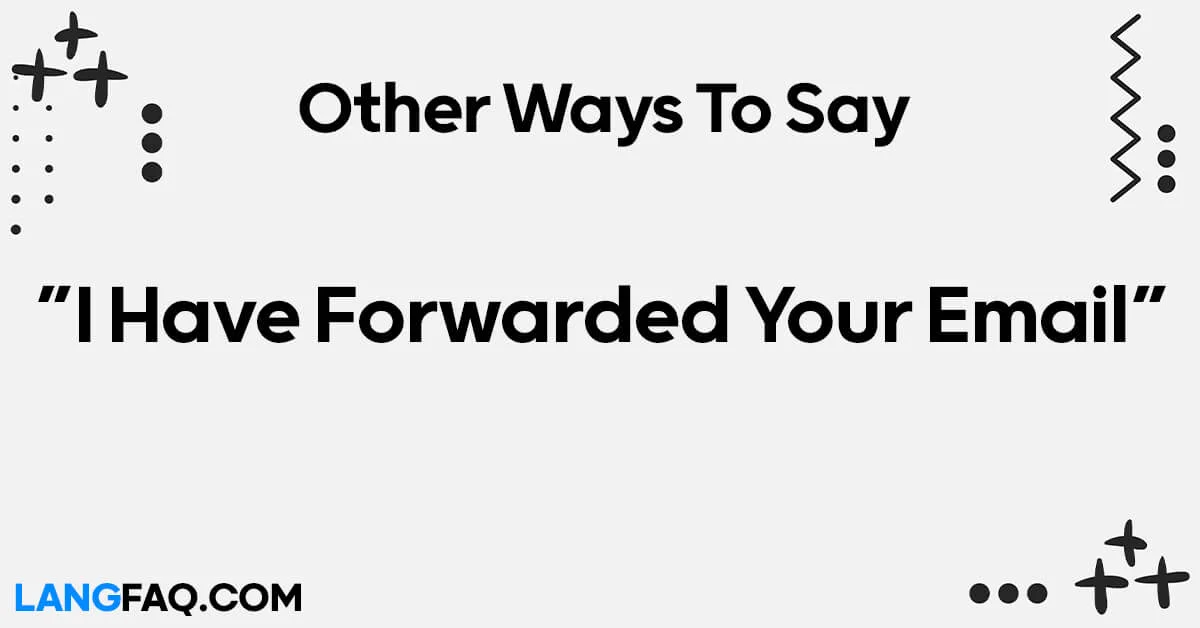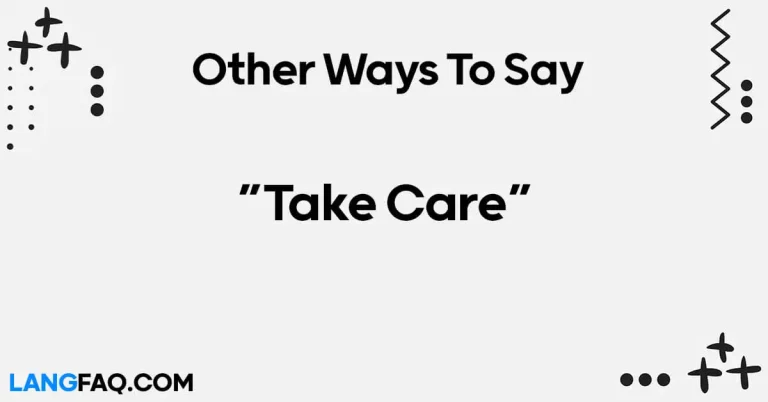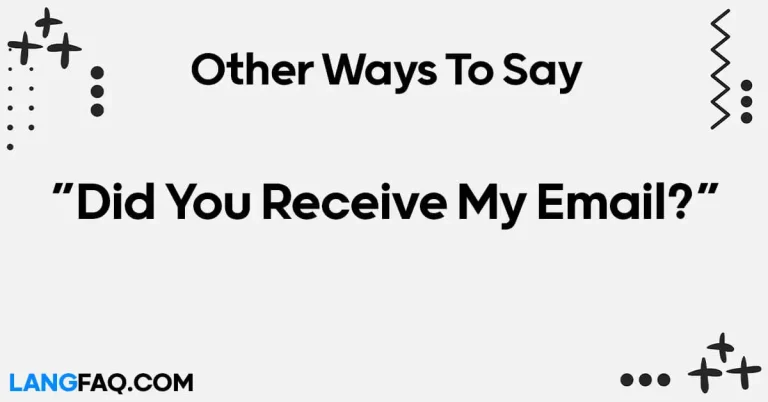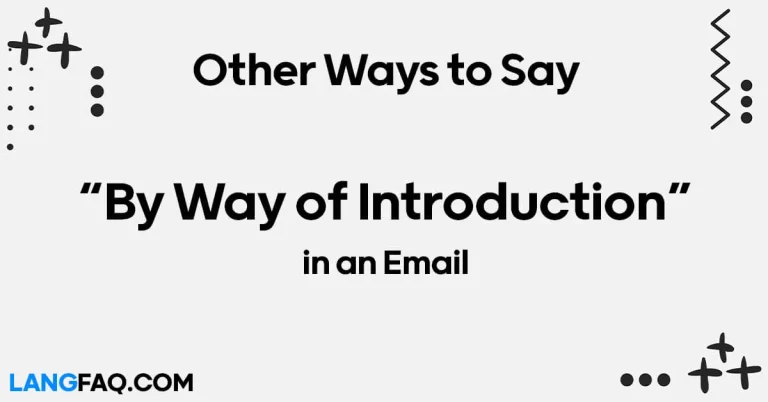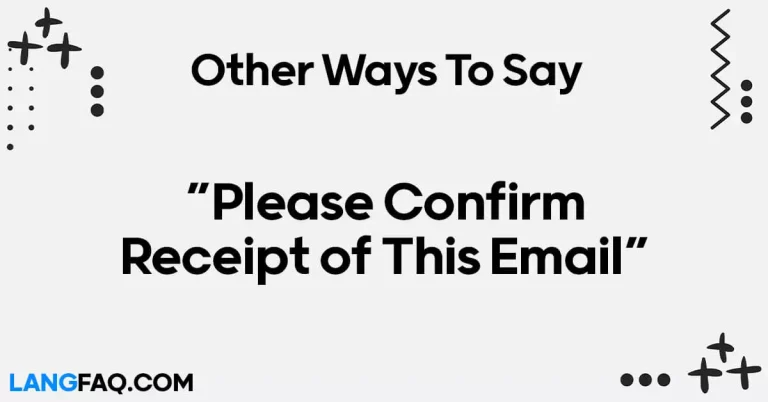Effective communication is crucial in both personal and professional settings. In the realm of emails, conveying that you’ve forwarded a message is a common occurrence. However, using the same phrase repeatedly can become monotonous. In this article, we explore 12 alternative ways to express “I Have Forwarded Your Email,” providing you with a diverse set of options to elevate your communication game.
12 Other Ways to Say “I Have Forwarded Your Email”
Here are 12 alternative ways to express “I have forwarded your email”:
- I’ve sent along your email.
- Your email has been passed on.
- I’ve shared your message with the necessary parties.
- Your email has been relayed to the concerned individuals.
- I’ve dispatched your correspondence to the relevant recipients.
- Your information has been transmitted.
- I’ve delivered your message to the intended recipients.
- Your email has been issued for prompt attention.
- I’ve facilitated the delivery of your message.
- Your correspondence has been consigned to the appropriate contacts.
- I’ve relinquished control of your email to the necessary recipients.
- Your crucial information has been passed on.
Here’s a table summarizing the 12 alternative ways to say “I have forwarded your email,” along with their meanings and examples:
| Phrase | Meaning | Example |
|---|---|---|
| I’ve sent along your email. | Conveying the action of forwarding an email. | “I’ve sent along your email to the team.” |
| Your email has been passed on. | Indicating that the email has been forwarded. | “Your email has been passed on to the manager.” |
| I’ve shared your message. | Communicating the act of sharing the email content. | “I’ve shared your message with the relevant parties.” |
| Your email has been relayed. | Stating that the email has been passed along. | “Your email has been relayed to the concerned team.” |
| I’ve dispatched your correspondence. | Expressing the prompt sending of the email. | “I’ve dispatched your correspondence for review.” |
| Your information has been transmitted. | Implying the transmission of the information in the email. | “Your information has been transmitted successfully.” |
| I’ve delivered your message. | Confirming the successful delivery of the email message. | “I’ve delivered your message to the intended recipients.” |
| Your email has been issued. | Signifying the formal issuance or distribution of the email. | “Your email has been issued for prompt attention.” |
| I’ve facilitated the delivery. | Emphasizing the facilitation aspect of the email delivery. | “I’ve facilitated the delivery of your important message.” |
| Your correspondence has been consigned. | Indicating the formal consignment of the email. | “Your correspondence has been consigned to the appropriate contacts.” |
| I’ve relinquished control of your email. | Suggesting the intentional transfer of email control. | “I’ve relinquished control of your email to the necessary recipients.” |
| Your crucial information has been passed on. | Communicating the passing on of vital information in the email. | “Your crucial information has been passed on to the relevant team members.” |
In conclusion, diversifying your language when communicating the action of forwarding an email not only adds variety to your expressions but also allows for nuanced and clear communication tailored to different contexts and relationships. Experiment with these alternatives to enhance your email communication skills.
Is It Correct to Say “I Have Forwarded Your Email”?
Yes, the phrase “I have forwarded your email” is grammatically correct and commonly used in professional and formal communication. It accurately conveys the action of sending or passing on an email to another person or group. This phrase is clear and direct, indicating that the recipient’s email has been transmitted to the intended party or parties.
Using this statement is appropriate in various contexts, such as work-related correspondence, business communication, or any situation where you need to inform someone that their message has been shared with others. It reflects transparency and ensures that the sender is keeping the recipient informed about the status of their email.
Example Sentence: “Dear [Recipient’s Name], I have forwarded your email to the relevant department for further consideration. Thank you for reaching out.”
This phrase is straightforward, polite, and widely accepted in both written and spoken communication. It aligns with professional norms and helps maintain clarity in email exchanges.
Professional Mail Example With “I Have Forwarded Your Email”
Subject: Acknowledgment and Forwarding of Your Email
Dear [Sender’s Name],
I trust this email finds you well. I wanted to acknowledge the receipt of your recent email and inform you that I have forwarded it to the appropriate department for further review and action.
Your message has been directed to [Department/Team Name], where our specialists will carefully assess the contents and respond accordingly. We understand the importance of your inquiry and are committed to addressing it promptly.
Please be assured that your email is in the hands of the experts who can provide the most accurate and comprehensive assistance. If there are any additional details or specific points you’d like us to prioritize, feel free to let us know, and we will ensure they are taken into consideration.
We appreciate your patience and cooperation as we work towards resolving your query. If you have any further questions or concerns, please don’t hesitate to reach out.
Thank you for choosing [Your Company/Organization]. We value your business and are dedicated to providing you with the best possible service.
Best regards,
[Your Full Name] [Your Position] [Your Company] [Contact Information]
1. I’ve Sent Along Your Email: Navigating Informal Conversations
In casual communication, using the phrase “I’ve sent along your email” can convey a sense of ease and informality. It’s particularly suitable when discussing everyday matters with colleagues or friends. This phrase ensures that the message has been forwarded without sounding too formal.
Scenario:
Imagine you’re updating a colleague about a project, and you’ve forwarded an important email containing project details.
Example Sentence:
“Hey [Colleague’s Name], I’ve sent along your email with the latest project updates. Take a look and let me know your thoughts!”
Email Sample:
Subject: Project Updates
Hi [Colleague’s Name],
I hope this email finds you well. Just wanted to let you know that I’ve sent along your email with the latest project updates to the team. Feel free to reach out if you have any questions or need further clarification.
Best, [Your Name]
2. Your Email Has Been Passed On: Formality in Professional Correspondence
When engaging in more formal communication, such as professional settings, the phrase “Your email has been passed on” maintains a level of formality. It signifies that the email has been transferred responsibly to the intended recipient or team.
Scenario:
You’re corresponding with a client, and you’ve forwarded their inquiry to the relevant department for a detailed response.
Example Sentence:
“Dear [Client’s Name], I wanted to inform you that your email has been passed on to our specialized team who will provide you with comprehensive assistance shortly.”
Email Sample:
Subject: Inquiry Response
Dear [Client’s Name],
Thank you for reaching out. I want to assure you that your email has been passed on to our dedicated team, and they will be in touch with you shortly to address your inquiry in detail.
Best Regards, [Your Name]
3. I’ve Shared Your Message: Fostering Collaboration
When working on collaborative projects, the phrase “I’ve shared your message” adds a touch of teamwork. It indicates that the email contains valuable input or insights that have been disseminated to the relevant collaborators.
Scenario:
You’re part of a team handling a project, and you’ve shared an email containing important updates from a team member.
Example Sentence:
“Team, I’ve shared [Team Member’s Name]’s email with the latest project updates. Let’s make sure we’re aligned on the next steps.”
Email Sample:
Subject: Project Collaboration
Hi Team,
I trust this email finds you well. I wanted to inform you that I’ve shared [Team Member’s Name]’s message with the latest project updates. Please review and let’s discuss during our upcoming meeting.
Best, [Your Name]
4. Your Email Has Been Relayed: Emphasizing Efficient Transmission
In contexts where efficiency is crucial, using “Your email has been relayed” highlights the prompt and accurate transmission of the information. This phrase is apt when time-sensitive matters are at play.
Scenario:
You’re part of a customer support team, and you’ve relayed a customer’s urgent request to the appropriate department for a quick resolution.
Example Sentence:
“Dear [Customer’s Name], I want to assure you that your email has been relayed to our support team for immediate attention.”
Email Sample:
Subject: Urgent Support Request
Dear [Customer’s Name],
Thank you for reaching out. I wanted to inform you that your email has been relayed to our support team, and they are actively working on addressing your request. We appreciate your patience.
Best, [Your Name]
5. I’ve Dispatched Your Correspondence: Conveying Prompt Action
In professional settings that demand swift responses, saying “I’ve dispatched your correspondence” signifies that immediate action has been taken upon the received email.
Scenario:
You’re managing a project, and you’ve swiftly dispatched an email containing crucial project updates to your team.
Example Sentence:
“Team, I’ve dispatched the email with the latest project updates. Please review and let’s discuss any necessary adjustments in our meeting tomorrow.”
Email Sample:
Subject: Project Update Dispatch
Hi Team,
I trust this email finds you well. I wanted to inform you that I’ve dispatched the email containing the latest project updates. Your prompt review before our meeting tomorrow is highly appreciated.
Best, [Your Name]
6. Your Information Has Been Transmitted: Incorporating Technical Jargon
In more technical or formal contexts, saying “Your information has been transmitted” introduces a technological aspect to the communication, suitable for discussions involving data or critical details.
Scenario:
You’re handling sensitive information, and you’ve transmitted an encrypted email containing crucial data.
Example Sentence:
“Dear [Recipient’s Name], I want to assure you that your information has been transmitted securely using encrypted channels to ensure utmost confidentiality.”
Email Sample:
Subject: Secure Transmission Confirmation
Dear [Recipient’s Name],
I hope this message finds you well. I wanted to inform you that your information has been transmitted securely using encrypted channels. Please let me know if you have any further questions.
Best Regards, [Your Name]
7. I’ve Delivered Your Message: Ensuring Completion and Responsibility
In professional scenarios where accountability is crucial, stating “I’ve delivered your message” emphasizes the completion of the forwarding process and takes ownership of the responsibility.
Scenario:
You’re a team leader, and you’ve ensured the delivery of a critical message to your team members.
Example Sentence:
“Team, I’ve delivered the message with the updated project timelines. Please review and let me know if there are any concerns.”
Email Sample:
Subject: Timely Project Update Delivery
Hi Team,
I trust this email finds you well. I wanted to update you that I’ve delivered the message containing the revised project timelines. Your prompt attention to this matter is highly appreciated.
Best, [Your Name]
8. Your Email Has Been Issued: Adding an Assertive Tone
In situations that demand a more assertive communication style, saying “Your email has been issued” conveys authority and prompts attention to the forwarded content.
Scenario:
You’re in a managerial position, and you’ve issued an important email to your team for immediate action.
Example Sentence:
“Team, your email has been issued, and I expect prompt attention to the tasks outlined within it.”
Email Sample:
Subject: Issued Email Notice
Hi Team,
I hope this message finds you well. I wanted to inform you that the email containing crucial updates has been issued. Your immediate attention and action are required.
Best Regards, [Your Name]
9. I’ve Facilitated the Delivery: Emphasizing Thoughtful Process
In contexts where the process of forwarding involves careful consideration, using “I’ve facilitated the delivery” underscores the thoughtful and intentional nature of the action.
Scenario:
You’re coordinating with various departments, and you’ve facilitated the delivery of a comprehensive email to ensure smooth collaboration.
Example Sentence:
“Dear Team, I’ve facilitated the delivery of the email containing collaborative insights to ensure everyone is on the same page.”
Email Sample:
Subject: Facilitated Email Delivery
Hi Team,
I trust this email finds you well. I wanted to inform you that I’ve facilitated the delivery of the email containing important collaborative insights. Your feedback and input are highly valued.
Best, [Your Name]
10. Your Correspondence Has Been Consigned: Adding a Formal Touch
When dealing with formal settings, using “Your correspondence has been consigned” adds a touch of formality, suitable for professional emails or official communication.
Scenario:
You’re handling correspondence with a client, and you’ve consigned their email to the appropriate department for detailed attention.
Example Sentence:
“Dear [Client’s Name], your correspondence has been consigned to our specialized team, who will address your inquiry promptly.”
Email Sample:
Subject: Consigned Correspondence Notice
Dear [Client’s Name],
Thank you for reaching out. I wanted to assure you that your correspondence has been consigned to our dedicated team, and they will be in touch with you shortly to address your inquiry in detail.
Best Regards, [Your Name]
11. I’ve Relinquished Control of Your Email: Communicating Delegation Effectively
In situations where delegation is a key aspect, using the phrase “I’ve relinquished control of your email” communicates the intentional transfer of responsibility.
Scenario:
You’re managing a project, and you’ve delegated the handling of specific tasks mentioned in an email to a team member.
Example Sentence:
“Team, I’ve relinquished control of the email outlining the tasks to [Team Member’s Name]. Please coordinate directly with them for any further details.”
Email Sample:
Subject: Delegation Notice
Hi Team,
I trust this email finds you well. I wanted to inform you that I’ve relinquished control of the email outlining specific tasks to [Team Member’s Name]. Kindly coordinate directly with them for further details.
Best, [Your Name]
12. Your Crucial Information Has Been Passed On: Emphasizing Significance
When dealing with critical information, saying “Your crucial information has been passed on” ensures that the recipient understands the importance of the forwarded content.
Scenario:
You’re in a leadership role, and you’ve passed on essential information to relevant team members for immediate action.
Example Sentence:
“Dear Team, your crucial information has been passed on to the necessary parties for urgent attention. Your swift action is appreciated.”
Email Sample:
Subject: Urgent Information Passing
Hi Team,
I hope this message finds you well. I wanted to update you that your crucial information has been passed on to the necessary parties for urgent attention. Your prompt action is highly appreciated.
Best Regards, [Your Name]
FAQs
Q: How can I choose the right phrase for my message? A: Consider the formality of the situation and your relationship with the recipient. Opt for phrases that resonate with the context.
Q: Are these alternatives suitable for both professional and personal emails? A: Yes, the provided phrases are versatile and can be adapted to various communication scenarios.
Q: Should I use these alternatives sparingly? A: While variety is beneficial, maintain a balance. Reserve more formal expressions for professional contexts.
Q: Can I combine these phrases for a more personalized message? A: Absolutely! Feel free to mix and match phrases to create a unique expression that suits your communication style.
Q: Do these alternatives work in non-English contexts? A: Many of these phrases can be adapted or translated to suit non-English communication, ensuring versatility.
Q: How can I gauge the effectiveness of these alternatives? A: Pay attention to recipient responses. If clarity and understanding are evident, your chosen phrase is effective.
Conclusion:
Diversifying your language not only prevents communication fatigue but also adds depth and clarity to your messages. The 12 alternatives provided offer a spectrum of expressions for effectively conveying, “I Have Forwarded Your Email.” Experiment with these phrases to enhance your communication skills and leave a lasting impression.

